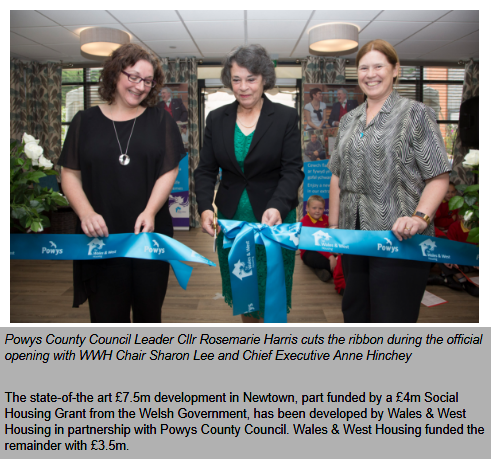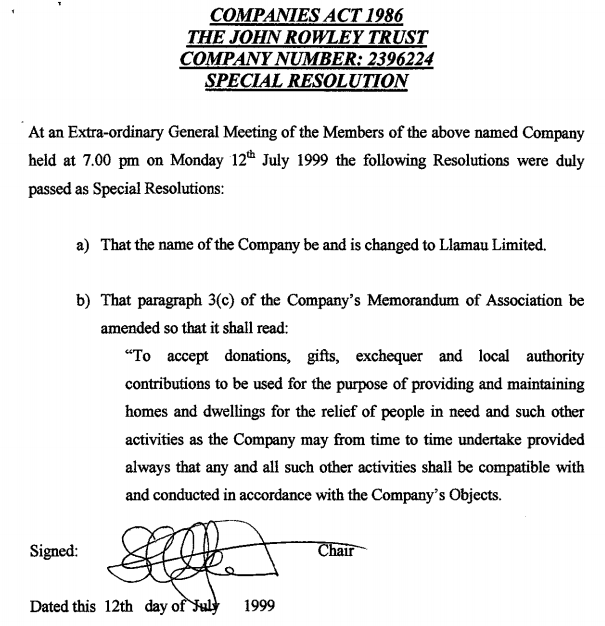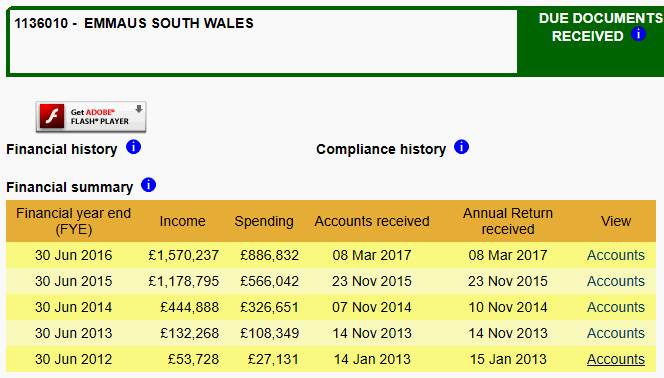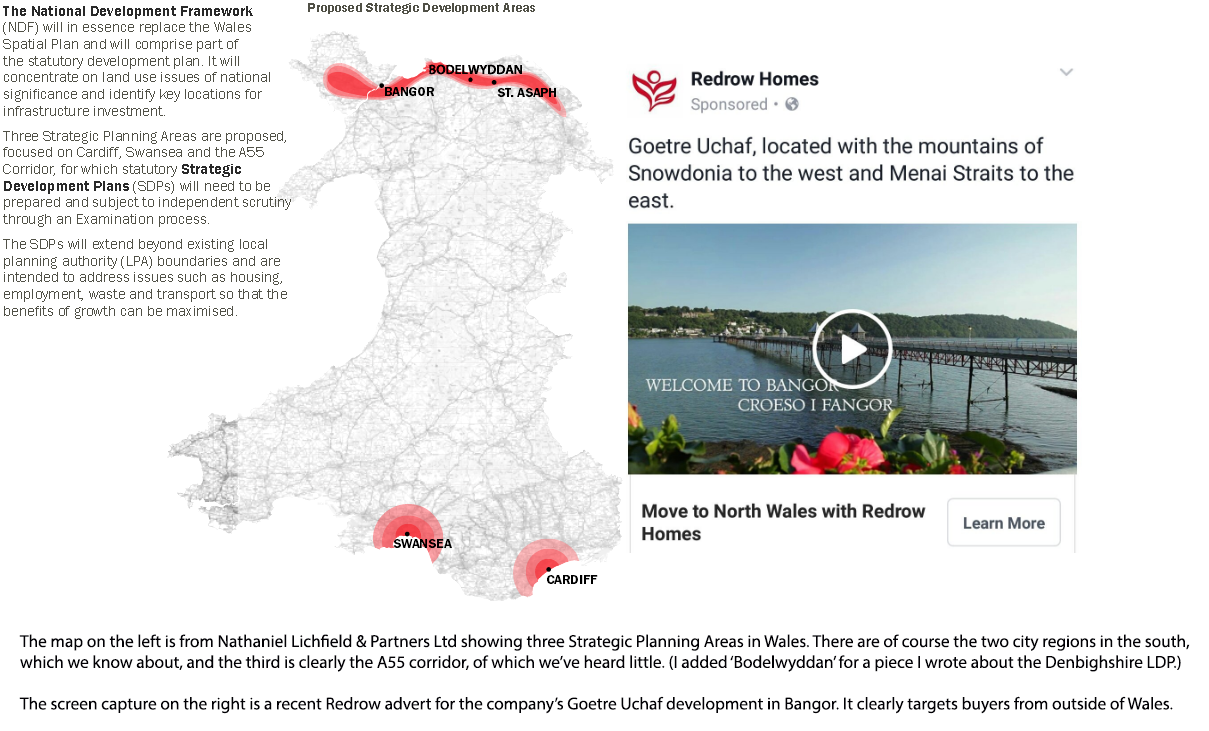It may be Hallowe’en but you’ll find no ghosties or ghoulies here, just the usual parade of grotesques and exhibitions of idiocy and cupidity that haunt modern Wales. Night and day. All year round.
Seeing as I haven’t put anything out for over a week this is a bumper issue, around 4,000 words, but there’s no single, linking theme other than the sheer fuckedupedness of Wales. I have, as old Nennius said, ‘made a heap of things’. On the plus side, because this is a meal made up of a number of courses, you can take your time.
Enjoy.
And if kids come knocking on your door, demanding money with menaces, set the dog on them.
∼
THE OLIVE TRUST
In the previous post, Hate Crime, I told you about the insults aimed at me by Denise Kingsley-Acton, a very strange woman currently domiciled in Kidwelly. A very strange woman indeed. That anyone takes her seriously is difficult to believe, but if they do it may be due to the fact that she has a ‘minder’ in the form of Swansea Labour councillor for 43 years, and now Alderman, Alan Lloyd.
While Lloyd obviously opens doors for Denise Kingsley-Acton, it’s difficult to see what he gets out of it. But being a former Labour councillor we can be sure that he’s not acting as her guide and guarantor for altruistic reasons.
Since posting that piece last week a bit more information has come to light, some of which was added as an update, some of which will be fresh.
You no doubt shared my astonishment that this woman had been given a grant to educate young people about hate crimes. According to her Facebook page she had received a grant from the “Police Commissioner for Dafed (sic) Powys”. So I wrote to the PCC.
The initial response from the office of the PCC said, “The Police and Crime Commissioner has not awarded a grant to the Olive Trust. The grant was awarded from the Safer Dyfed-Powys Diogelach charity, to which the Commissioner is a trustee.”
After a follow-up e-mail I was told, again from the office of the PCC, “The grant was awarded to the Olive Trust as an organisation and it was for £1000.” The wording suggests that we should regard the Olive Trust as something unconnected with Denise Kingsley-Acton, when in fact she is the Olive Trust, and the Olive Trust is her.
I’m still waiting to hear if the grant offer has been withdrawn.
The latest entry on the Olive Trust Facebook page is shown below.

Denise Kingsley-Acton says I have harassed her “continually for many years”. The truth is that in 2012 I wrote about her attempt to screw £1,000,000 out of the Wales European Funding Office. There was a passing reference in September 2014, before two pieces about her in March this year after someone had drawn my attention to an article in Llanelli Online.
That was it, until the bizarre and slanderous allegations that came out of the blue on October 19. Had I not received those insults it’s unlikely I would have written about her ever again.
But if I learn that the Olive Trust or Denise Kingsley-Acton is trying to rip off the public purse, again; or if she posts slanders about me, again; then I shall write about her, again. And that’s a promise.
♦
MUMBLES PIER
Mumbles and its pier is close to my heart. I can remember as a young boy riding the old Mumbles Train that used to clatter along the seafront.
In my early teens I spent many happy hours, whole days even, fishing. We’d usually cycle down, fishing rods strapped to our crossbars, bags on our backs containing tackle, bait, sandwiches (which often got mixed up).
At the pier we’d follow the tide out, which meant, once the two top bars of the safety rail around the eastern ‘well’ on the intermediate level became visible, working our way along, standing on the middle bar and holding tight onto the top one with one hand while holding our rod in the other, with bag on back, until we reached the far side, so that the fast ebbing tide could take our lines. And as the tide ebbed further the death-defying stunt was repeated on the bottom level.
I look back at what we did then and I wonder how we survived. Because anyone falling into the ‘well’ would either have been trapped under the floor and drowned, or else been taken out to sea so fast that they would have been lost unless a nearby boat could have reached them quickly.
From home to pier was a seven-mile ride, which was great on the first leg, partly because we were fresh and partly because it was downhill into town and then flat along the Mumbles Road. Coming home after a day’s fishing the pedals would always be heavier, especially if there were no nice fish to show your mam.
As an older teenager I did the Mumbles Mile on a Saturday night. Often after watching the Swans. We’d come out of the Vetch, have a bite to eat in a little caff we used in Wind Street, wash and brush up in one of those old public conveniences with an attendant, then catch the bus (was it the 77?) to Mumbles – White Rose, Pilot, Prince of Wales, Antelope . . . before walking home, which with diversions and digressions might mean getting home in time for breakfast
But then, I’m sure Mumbles and the pier plays a role in the life of anyone from Swansea and the wider area.
So it’s understandable why there is such interest in the proposed development. Now I shan’t comment on the development itself because it’s complicated – obstruction of views, etc – and I don’t have the space here, but there are a few points worth raising.
Someone we’ve encountered on this blog more than once is Lawrence Bailey, former leader of the local Labour Party, former Lord Mayor, and of course leader of the council. Or, rather, he was fulfilling these roles when he could tear himself away from his real interest of pornography. For which he was awarded the coveted Private Eye Pornographer of the Year award.
He also used to write to the Evening Post as Phyllis Evans of Cwmrhydyceirw, Disgusted of Dunvant, and a host of others who all seemed to support the Labour Party. Fancy! It seems likely that the Beans on Toast was complicit in this deception.
After these unfortunate revelations Bailey resigned from the council and branched out into public relations with a company called Whiterock, which first came to my attention when ‘Stan’ pointed out that this outfit was receiving regular payments from the dike-bashing MP for Swansea East, Carolyn Harris.
(Who, let’s be brutally honest, needs all the image-massaging she can get.)
Bailey seems to have used the Whiterock name for some time before registering it with Companies House in August 2015. Nothing else was ever filed with Companies House and Whiterock-Wales was dissolved in January 2017.
And yet, if we go to the Whiterock website and scroll down we read ‘© whiterock wales (2018)’, suggesting the company yet breathes – but under what name, and in what form? Is it Whiterock Wales; Whiterock Public Affairs, as on the website; Whiterock-Wales, as with the defunct company on the Companies House website; or Whiterock Consulting as on Bailey’s Linkedin profile.
This is something I come across regularly, many different but similar names designed solely to confuse. So tell us, Lawrence, what is the name of your company and is it registered? Nobody’ll care if you’re just a one-man band. We all know you enjoy your own company.
Of course, Bailey’s big attraction for any potential client is that he knows the local Labour Party, he’s another like Lloyd who can open doors. So it should surprise no one to learn that he is representing owners Ameco who are hoping to make many millions of pounds from luxury housing in the vicinity of the pier as the ransom price for renovating the pier itself.
There was a meeting a couple of months back between the developers and the council, or at least, the council leader, Rob Stewart. Someone sent me a link to a secretly-filmed video, which I can no longer find, but fortunately I took a few screen grabs which you can see below.

Stewart is the one in the dark suit and Bailey is the grey-headed geezer.
This is all run-of-the-mill stuff for a Labour council, but now protesters are arguing something very odd may have happened around the time the outline planning application (2010/1451) was received by the council on 17 September, 2010.
This was during a period when the city was enjoying a respite from Labour rule with a Lib Dem-led alliance in charge. Which of course meant that Bailey’s political connections would have counted for naught.
What’s being suggested is that during a process of digitisation in 2010, by the council’s officers, the boundary of the Gower Area of Outstanding Natural Beauty was moved so that the land on which the housing development is now planned was somehow moved outside the AONB. Here’s a BBC report.
Now if this suggestion is true, then it could scupper the whole development. If the boundary change was deliberate rather than error, then who might be responsible? Names of people – who may or may not be connected with Lawrence y Garreg Wen – carry on zephyrs wafting up from Mumbles.
Anyone with information is welcome to get in touch, with the usual guarantee of anonymity. Either use the contact box in the sidebar or write to editor@jacothenorth.net.
UPDATE 03.11.2018: The whole thing has now been put on hold by the ‘Welsh’ Government. It seems Swansea council has the power to refuse planning permission but it does not have the power to grant planning permission.
UPDATE 07.11.2018: In a strange twist, Swansea council’s planning committee has unanimously voted to approve the scheme. Does this mean that the Labour Party in Swansea is starting to stand up to London’s management team in Cardiff? Does it suggest that opponents of the scheme may not be as representative of the wider public as they might like to believe?
♦
A LITTLE PLACE IN THE WEST
You may recall that the chief executive of Carmarthenshire County Council, Mark Vincent James, has a keen personal interest in property, with properties of his own in Cardiff Bay. I wrote about this in Baywatch and Baywatch 2.
Now I learn that he is branching out with a company called Cartrefi Croeso Cyfyngedig (CCC, geddit?) This report from 6 June tells us, among other things, that, “The council is the sole shareholder in Cartrefi Croeso, which will have five directors – two council officers, one councillor and two external appointees.”
As I say, that was early June, here we are at the end of October and according to Companies House there are just two directors, both employees of the council, and therefore answerable to Mark James not the elected representatives. But James’s hold over this new company doesn’t end there.
This report from 23 October tells us that plans are well advanced for “32 new homes costing £4m” in Burry Port. The report also informs us that the managing director of Cartrefi Croeso is Robin Staines. So who is he? Well, he’s ‘Head of Public Protection, Housing and Care & Support Services, Carmarthenshire County Council‘. Staines is a Cockney, imported by James, and therefore totally loyal to his master.

So we now have a company, Cartrefi Croeso Cyf, using public money, run by people answerable only to Mark James, but with no democratic accountability whatsoever. What the hell is the Plaid Cymru-led council doing?
A regular source whose judgement I trust reminds me that Cartrefi Croeso is another arms-length company of the kind that Mark James seems to favour as a way of running and controlling things without having to worry about answering to those who pay his salary. Or anyone else.
Another such company is CWM Environmental Ltd. (Carmarthenshire Waste Management.) Something similar has happened to social care, and leisure services will be next. While looming at Delta Lakes is the Wellness Centre Village, where the lame shall be made to walk, one-eyed Scarlets’ supporters will be blessed with 20/20 vision . . . and some shifty buggers will make a fortune from the public purse thanks to Mark Vincent James.
From the perspective of a man like Mark James setting up private companies run by his placemen offers many advantages. Like some Mafia don he controls things but his underlings take any flak. Being private companies they are not subject to Freedom of Information requests (as they would be as in-house council departments). And of course rules on the use of the Welsh language do not apply.
It is quite amazing how, in a Western democracy, the employee of a public body can take over that body and run it as if it were some private company he had created himself! Which would be bad enough, but neither the elected representatives of those that employ him, nor the superior level of government that should be holding him to account, are prepared to do anything!
But as I keep saying, Wales has more in common with the third world than with Western Europe: Poverty, colonialism, exploitation, colonisation, widespread corruption, no oversight and monitoring of public officials and public bodies, etc., etc.
♦
A FAIT ACCOMPLI
Midnight yesterday was the deadline for submissions in a consultation process launched on July 10 about the Basic Payment Scheme (BPS) to farmers. It’s been pretty clear for some time that the whole issue is being controlled from London and that the management team in Cardiff docks is simply doing what it’s told, and saying what it’s told to say.
This is fall-out from the EU (Withdrawal) Bill debate earlier this year. Remember? After first making a bit of a show of standing shoulder to shoulder with Nicola Sturgeon and the Scottish Government Carwyn Jones did what we always knew he’d do – surrender to England.
Though in fairness it was all play-acting, for his masters had decided the outcome long in advance. The showboating and the bluster, the trips to Edinburgh, the ‘strong words’ for Mrs May’s government, were designed to placate a certain audience that in Wales often seems to care more about the EU than it does about Wales.
As a direct consequence of the Labour management team agreeing that the London Government could effectively withdraw BPS we now face the destruction of Welsh upland farming, together with the jobs, plus the language and the culture, farming sustains.
But this has little to do directly with Brexit, for if Carwyn Jones had not surrendered powers to London Welsh farmers could be receiving the same treatment as their Scottish counterparts, who have been guaranteed the continuation of the Basic Payment Scheme.

The sad little mouthpieces of the collaborationist regime in Cardiff docks, are reading from scripts prepared for them by civil servants like those you see above, one of whom has been heard to say that he hates farmers! Making it clear that Welsh farmers are to be forced from their land to make way for more English settlers. I wrote about it in The Welsh Clearances.
I can hear the objections – ‘But you misrepresent the proposals, Jac!’ Do I? Let the readers decide.
Funding is to be withdrawn from farmers and given to environmentalists, ‘re-wilders’ and others without whose help Mother Nature would simply give up and go home. The losers will almost all be Welsh, while the winners will be overwhelmingly English, but we’re expected to believe that this is pure coincidence.
Though it must be said, that over many years there have been some people (especially in Plaid Cymru) who have been very supportive of this replacement population. In fact, some seem to have identified more strongly with incoming ‘environmentalists’ than with their own people.
While Remain fanatics argue that farmers have brought it on themselves by voting for Brexit. Ignoring the fact that this is a decision taken by the London government using Brexit as a pretext.
Wake up! This is undisguised colonialism. Taking land off the natives is what our masters are good at, they’ve been doing it for centuries. That so much Welsh land is still in Welsh hands is an affront to everyone in whose veins runs the blood of pith-helmeted district officers and their crinolined memsahibs.
♦
THE DISASTER OF DEVOLUTION
Reading this blog can I’m told be both entertaining and informative, but often depressing. (It’s the same writing it, but I take my ‘medicine’.) While things at the moment may look more depressing than usual I’m strangely – perhaps perversely – encouraged by recent developments.
First, the crushing defeat dished out to Leanne Wood in the Plaid Cymru leadership election made her acolytes realise how little support there is for niche politics. And if there is little support within Plaid Cymru for such nonsense then there’s even less support in the wider population. But then, when you debate issues in echo chambers you can persuade yourself that everybody is discussing what you and a tiny group of friends think is important.
That said, I can’t see Plaid Cymru getting its act together over the longer term. It will fall back into its old ways, because despite being a minority, the niche left knows how to inveigle itself into positions of influence and authority, and to intimidate others into silence. The ‘nationalists’ will have to reach some compromise with LW’s supporters.
Which means that eventually, a new party will be needed to prioritise the needs and interests of Welsh people while working towards the independent state that alone can permanently safeguard those needs and interests. Ein Gwlad already exists, and will grow into that role.
Looking at the wider picture it should now be obvious that devolution is a sham. But worse than being a sham, devolution, and the existence of a ‘Welsh’ Government, allows the UK government to get away with things that might have been very difficult without devolution.
Let’s take a few very recent examples to explain what I mean.
∼
THE FLINT RING
This ‘initiative’ came from Cadw, which is just English Heritage West, ensuring a ‘safe’ and acceptable interpretation of Welsh history. That being so, we can be sure that the Flint Ring idea originated over the border.
To give an example of how Cadw operates I’ll go back a couple of years to something I found on its website. Cadw was promoting, “It’s 1295 and peace reigns in Caernarfon”, before going on to paint a picture of English soldiers flirting with Welsh maids. (Yes, honestly!)

The truth is of course that in 1294/5 Wales was in rebellion, and Caernarfon Castle was taken by Madog ap Llywelyn’s men. Any English soldiers still in the castle would either have been lying dead somewhere or, if they were lucky, languishing in the dungeons.
After I put out a tweet Cadw immediately took the page down. But why did the body entrusted with interpreting and presenting Welsh history get it so wrong, giving out a picture of Welsh and English living happily together in conquered Wales, us Welsh not at all resentful?
Shit! I’ve just answered my own question.
Interpreting a colonial people’s history is fundamental to maintaining a hold over that people. This is Cadw’s role in Wales. (And of course, ensuring that no Welsh are employed at our castles and other monuments.)
Far easier to do this with a Welsh name and the pretence that Cadw is an agency of a ‘Welsh’ Government.
∼
PRINCE OF WALES BRIDGE
Yes, I know, this was announced by Alun Cairns, Conservative Secretary of State for Wales, but Labour First Minister Carwyn Jones was involved from very early on, and to a considerable degree Jones’s approval was used to justify the whole thing. A kind of joint enterprise, sharing the blame.
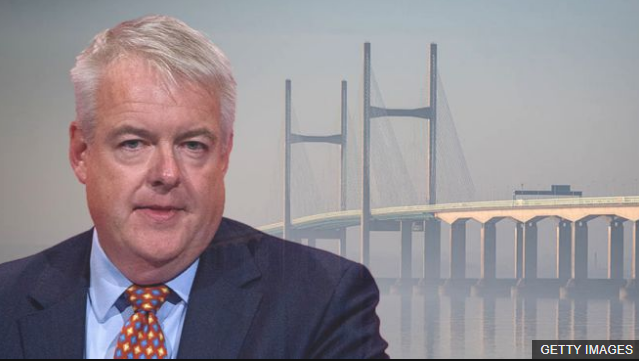
Had the naming been imposed directly from London there would have been far more opposition, maybe even from within the Labour Party. Devolution served to confuse what was a clear, colonialist imposition.
∼
TOXIC MUD
This was another clear, colonialist imposition. But because the ‘Welsh’ Government, and Natural Resources Wales were so co-operative, and so devious about their involvement, it served to confuse the picture. It left those objecting uncertain who to blame.
Which, again, could not have happened without the ‘shield’ of devolution.
∼
M4 MONEY
The ‘M4 improvements’ is a long-running saga.
‘Business’ believes that the M4 must be upgraded to do away with bottlenecks and speed up travel between England and Cardiff. Most politicians seem to agree.
Late in 2013 the UK/English government gave the ‘Welsh’ government power to borrow up to £1bn to spend on the M4. On Monday we learnt from the Chancellor of the Exchequer that there was now an extra £300m available, but only if it is spent on the M4.
Huffing and puffing, millionaire socialist contender for the purely figurehead positions of leader of the English Labour Party in Wales and First Minister, Mark Drakefraud, insisted it was up to AMs how the money was spent.
Small but perfectly formed SoS Alun Cairns retorted by saying that the ‘Welsh’ Government had asked for the money specifically for the M4. ‘Liar’ liar, pants on fire!’ shouted Drakefraud, at which point the exchange got too highbrow for this simple old Swansea Jack.
Make sense of it here if you can.
The bottom line is that improving the M4 will help England far more than Wales because improving communications to peripheral regions invariably works against those peripheral regions. It means what makes them attractive can be reached easier and what makes such regions valuable can shipped out faster.
If the M4 ‘improvements’ go ahead jobs will be lost because it will be easier to serve ‘South Wales’ from depots and offices in England, but Wales’s cheaper homes will be brought within reach of more English commuters to Bristol and the Thames Valley.
What the A55 has done for the north on a bigger scale.
How much easier it is to perpetrate this con with the help of a ‘Welsh’ Government that can’t see beyond Cardiff – and then get the silly buggers to put the whole country in debt to pay for it! Self-financing colonialism.
Just imagine no devolution, and the UK government saying it wanted to upgrade the M4 but that Welsh local authorities were going to pay for it.
UPDATE: On the very day this post appeared this letter was published in the Western Mail. I have no idea who David Gwyn Watts of Milford Haven is, but he’s right. (Though I think the Letters Editor went a bit overboard with ‘doom’.)
∼
WELSH CLEARANCES
As you’ve read above, Welsh farmers will be forced from their land in a policy worthy of comparison with Clearances or ethnic cleansing. The orders come from London. Civil servants answering to London will implement the strategy in Wales. And Welsh politicians will pretend it’s their policy out of a combination of vanity, congenital deviousness, and contempt for those who’ll suffer.
If a government minister had stood up in the House of Commons and said, ‘Her Majesty’s Government plans to clear Welsh farmers from their ancestral land and replace them with English environmentalists, ‘re-wilders’ and the like’, there would have been uproar in Wales. There would have been demonstrations, riots even.
But no, get some stupid woman in Cardiff to pretend it’s a decision of her ‘government’ and it confuses the natives. Use devolution as a ‘screen’ and as with the Flint Ring, and The PoW Bridge, and the toxic mud, and the M4 money, and a host of other damaging schemes, we won’t know who’s really to blame, and who we should be attacking.
∼
This confusion can only arise because of devolution. And because of the way London uses devolution, and because of the way our politicians allow devolution to be used. Strip away devolution and we’ll see colonialism for what it really is.
Forget the comforting bollocks about devolution being a ‘badge of nationhood’. Welsh nationhood is being destroyed behind the façade of devolution. Devolution is a Trojan horse.
I predict with certainty that if there is another Tryweryn or another Investiture, it will be presented as a decision of our wonderful ‘Welsh’ Government, and because of that, it will be accepted by more Welsh people than if it had come in the form of a diktat from London.
If we had a vote to abolish the Assembly, I would vote to abolish. And I wouldn’t need to think twice about it.
♦ END ♦




















